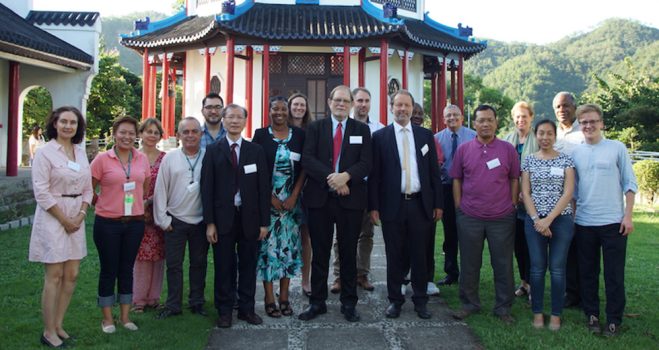The globalization of the world economy has not been an even process, and in many ways governance for the protection of capital has overtaken governance for the protection of human well-being. A recent Ecumenical School on Governance, Economics and Management (GEM) for an Economy of Life addressed this very asymmetry.
Held in Hong Kong from 22 August – 2 September, the focus of the school was the insight that financial and economic policies have been fine-tuned over several decades to benefit a small minority, deepening socio-economic disparities around the world.
The GEM school, offered by the World Council of Churches and the World Communion of Reformed Churches, provides a 10-day learning environment in which participants ponder how to challenge unjust financial and economic architectures. It stems from the joint initiative of faith groups to work towards a New International Financial and Economic Architecture (NIFEA).
Participating in GEM school
Participants expressed the need to be aware of how a global economy works. Often, due to complex terminologies and definitions, many people think economics is just for economists. The school is founded on the belief that the knowledge of how global financial markets work and how policies are being drafted in the economic sector is essential for everyone as all lives are directly affected by those policies.
“Coming to the GEM school gave me a clear picture of how bad the situation is, of how bad the system is. If you do not speak this language you are not included in discussions around economic policymaking, and 90 percent of people don’t understand how economics and financial markets work,” commented Nerisse Karen Kaye Pamaran, executive assistant at Union Theological Seminary, Philippines.
Rev. Dr Thabo Cecil Makgoba, Anglican archbishop of Cape Town and metropolitan of the Anglican Church of Southern Africa, also participated. “Firstly I appreciate the reading material they gave us beforehand which prepared us to engage in the topics,” he said. “The professors were very inspiring, as they took us through plurality of economic thought. I was shocked to understand the underlying assumptions that dominant mainstream neoclassical economics makes and the values—such as individualism—that it promotes.”
There are other schools of economic thinking such as feminist and ecological economics as well. Another participant, Gustav Thiele from Germany, is a student of economics and member of the International Student Initiative for Pluralism in Economics. “My motivation from a student perspective to be part of the GEM school comes from the need to spread the idea of economic pluralism and to try to find more allies in civil society to challenge the ways in which economics is done these days.”
Working toward economic solutions
The GEM school focused on the need for a more equitable distribution of wealth and power in the financial and economic arena for global justice. In one way, the question is simple: How do we get from where we are to where we want to be? Participants said that solutions to our current economic problems are achievable; we need willingness from policymakers to positively act in this crucial situation and come up with rules and plans that are for the greater common good.
The GEM school also discussed the need to build mechanisms that will enable national and global, private and public institutions to be held accountable to people for their actions and doings. The growing need for accountability comes from the fact that with unjust and ineffective policy-making many people are adversely affected around the globe.
“During our exposure visit in the financial center of Hong Kong, we realized that the economic policies are not just a technical question,” said Thiele. “The fact is that it affects millions and millions of people, trying to make ends meet.”
Linking theology and economics
While trying to explore the interconnectedness of theology and economy, Blandina Faustin from Tanzania, advisor to the Young Women’s Christian Association, stressed the need for churches to learn about the financial gap. Theology stresses the need for a just world, where everyone lives in harmony and peace. Theology addresses equity, social cohesion, and life-in-fullness for all.
Rev. Dr Batara Sihombing, general secretary of the Indonesian Christian Church, said the purpose of theology is social welfare and the purpose of economy is also welfare, hence theology and economics run parallel. “We learned from the school that the aim of the economy should be the well-being of all creation, and for survival this is essential to understand.”
Thiele posed the question: How can theology help us change the fundamental assumptions of economics? “When you practice social science research, you make ethical research, economics seems to be about self-centered individuals. Theology provides a window to practice economics keeping in mind the poor.”
As the GEM school progresses, and as participants work on projects as a continuation of the school, Pamaran observed: “The GEM school made us realize that many things are human-centric and we also realized how anthropocentrism is detrimental to the life of the earth.”
Photo: Participants gathered for GEM School in Hong Kong. © Kalok Law/HKCC/WCC
This is a joint release between the World Council of Churches and the World Communion of Reformed Churches.
Learn more
- We’re the economy, stupid. (WCC Pilgrimage Blog 1 September 2016)
- What dazzles is inequality (WCC Pilgrimage Blog 1 September 2016)
- Current and future church leaders gather for GEM School on new financial and economic architecture (WCC press release of 19 August 2016)
- Economy of Life for All Now: An Ecumenical Action Plan for a New International Financial and Economic Architecture
- WCC Care for creation and climate justice


